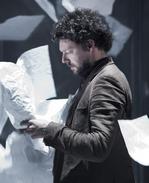SITE GUIDE
SEARCH
REVIEWS
REVIEW ARCHIVES
ADVERTISING AT CURTAINUP
FEATURES
NEWS
Etcetera and
Short Term Listings
LISTINGS
Broadway
Off-Broadway
NYC Restaurants
BOOKS and CDs
OTHER PLACES
Berkshires
London
California
New Jersey
DC
Connecticut
Philadelphia
Elsewhere
QUOTES
TKTS
PLAYWRIGHTS' ALBUMS
LETTERS TO EDITOR
FILM
LINKS
MISCELLANEOUS
Free Updates
Masthead
Writing for Us
A CurtainUp  London Review
London Review
 London Review
London ReviewPolar Bears
|
I'm the person holding the bottom of the kite string. — John
|

Richard Coyle as John (Photo: Johan Persson) |
In Mark Haddon's play there are no health professionals, no psychiatrist, therapist or counsellor, just her family. Kay's illness is vaguely referred to as "a disease" but she is bi-polar, the current name for manic depression. We do hear later however that she has not been taking her medication.
Haddon's structure is to move around out of chronological time order and his narrative is fractured, contradictory and at times mystifyingly incoherent which makes for a less comfortable and explicable theatrical experience. The narrator is John (Richard Coyle), Kay's understanding and loving husband and teacher of philosophy. As a philosopher he tells us that philosophy is about the possibility that you might be wrong and so it is with Polar Bears.
The opening scene puzzles us as John is telling Kay's brother Sandy (Paul Hilton) that he has murdered her and her body is in the cellar. But later Kay phones in the most excited and charming way from Oslo where she says she is having a wonderful time. Slowly it dawns that some of these scenes are fantasy — but which?
Maybe with this play we need to question everything that we hear because it may not be true. This seems to be confirmed when we meet Jesus (David Leon) in conversation with Kay. We have some glimpses of Kay's childhood with her brother Sandy through accounts from their mother Margaret (Celia Imrie) who talks about Kay's moods.
There is another illustration through one of Kay's stories for children, about a pair of twins, a little girl and a monster. We first think that her brother Sandy might be that monster, especially after the scene from their childhood where he makes Kay stand on a chair with her head in a rope noose and read out their father's suicide note. Their father was found having committed suicide hanging from the banisters. His father before him died an unnatural death. There is of course another explanation which is that the monster is another aspect of Kay's fractured psyche.
There are clues to as to the possible reason for Kay's condition with hints at abusive relationships in her childhood. The Jesus figure gives a long and stomach churning description of the putrefaction of a corpse but I'm not sure why.
The performances are excellent. Celia Imrie's vague, defensive mother, Paul Hilton's stiff, suited, hard businessman, Richard Coyle's patient carer and lifeline and of course the wonderful Jodhi May as Kay, charismatic, beautiful, creative and very bright, until the darkness comes when she becomes unreasonable and unmovable, raging and smashing the cup of tea John has brought to her. Jamie Lloyd creates some powerfully visual scenes from Haddon's text.
Soutra Gilmour's set has a dilapidated ceiling with torn out panels from which float down Kay's sheets of paper with her children's stories to the sound of slicing metal. Behind the bare wooden floored set there is aluminium coloured panelling but with clear sliding panels placed in front with layers of meaning.
Polar Bears has cathartic moments and some of real beauty as the play describes what it feels like to live with this illness and how very difficult it is for those close to those with bi-polar. So much of this kind of discussion of mental illness is looked at dramatically with the hemmed in conversations between a psychiatrist and his patient, that is it is refreshing to see Mark Haddon tackle the subject with something more expressionistic.
|
Subscribe to our FREE email updates with a note from editor Elyse Sommer about additions to the website -- with main page hot links to the latest features posted at our numerous locations. To subscribe,
E-mail: esommer@curtainup.comesommer@curtainup.com
put SUBSCRIBE CURTAINUP EMAIL UPDATE in the subject line and your full name and email address in the body of the message -- if you can spare a minute, tell us how you came to CurtainUp and from what part of the country. |
| Polar Bears
Written by Mark Haddon Directed by Jamie Lloyd Starring: Jodhji May, Richard Coyle, Paul Hilton, Celia Imrie With: David Leon Design: Soutra Gilmour Lighting Designer: Jon Clark Composers and Sound: Ben and Max Ringham Running time: One hour 40 minutes without an interval Box Office: 0844 871 7624 Booking to 22nd May 2010 Reviewed by Lizzie Loveridge based on 10th April 2010 matinee performances at the Donmar Warehouse, Earlham Street, London WC2H 9LX (Tube:Covent Garden) |
|
REVIEW FEEDBACK Highlight one of the responses below and click "copy" or"CTRL+C"
Paste the highlighted text into the subject line (CTRL+ V): Feel free to add detailed comments in the body of the email . . . also the names and emails of any friends to whom you'd like us to forward a copy of this review. |
|
London Theatre Tickets Lion King Tickets Billy Elliot Tickets Mighty Boosh Tickets Mamma Mia Tickets We Will Rock You Tickets Theatre Tickets |




